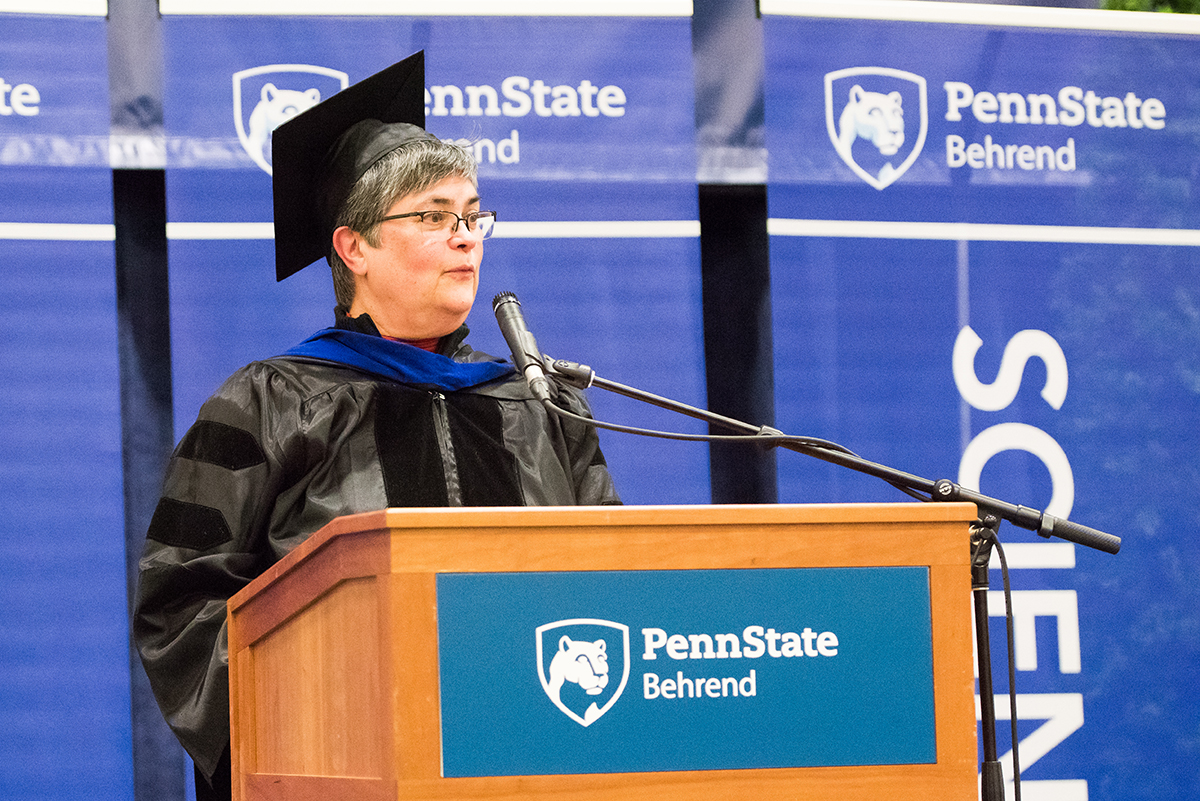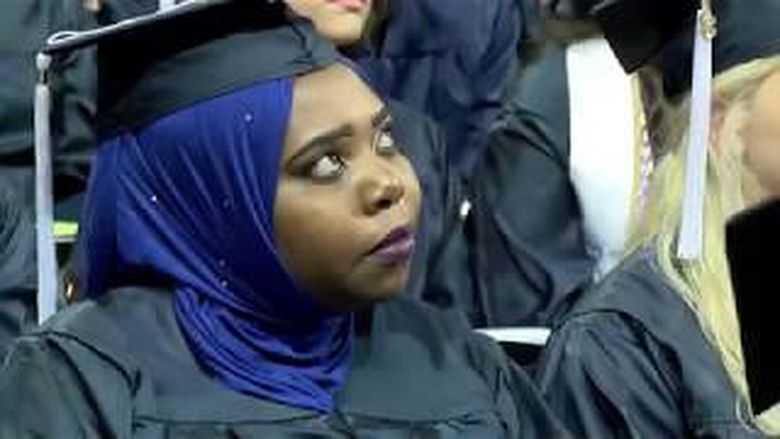Professor of Spanish Dr. Soledad Traverso gave a Faculty Address titled “Surrealism in Everyday Life” at the fall 2016 commencement in Junker Center.
A native of Chile, Traverso began her teaching career at her undergraduate alma mater, the University of Antofagasta. She earned her doctoral degree in Latin American literature at the University of Maryland and taught at Bucknell University prior to joining the Penn State Behrend faculty in 1996.
The author of two books on the writings of Chilean novelist Juan Emar, Traverso most recently published "Medical Spanish for Nurses: A Self-Teaching Guide." Co-written with Dr. Laurie Urraro, lecturer in Spanish, and Dr. Patty McMahon, director of the Health and Wellness Center, this textbook teaches medical professionals the vocabulary needed to take patient histories, assess pain, and conduct physical assessments of their Spanish-speaking patients.
The book and language courses for both professional and student nurses grew out of an offhand comment made to Traverso by a nurse who wished that she had some knowledge of Spanish.
 When was the last time that you had a surreal moment? Something like, “OMG, I can’t believe that this is happening! It’s surreal!”
When was the last time that you had a surreal moment? Something like, “OMG, I can’t believe that this is happening! It’s surreal!”
I am sure that it wasn’t too long ago. For some of your parents, who are thinking “I can’t believe my child finally is graduating,” right now might be a surreal moment.
Well, behind that expression there is a cultural movement that can teach us how to deal with uncertainty, the unknown, and the unexpected—some things that you may be facing as you graduate today. Yes, we generally connect Surrealism with famous crazy people who painted weird things, like Salvador Dali’s melting clocks in The Persistence of Memory. But let me tell you that Surrealism is a world vision, a cultural movement born between the two World Wars, from 1918 to 1939. It emerged as a reaction against the mentality and politics that caused the horrors of World War I. This group of artists and writers felt that nothing had been solved and that the next war was imminent.
So the surrealists purposely wanted to shock. They wanted to wake people up from a state of conformity and lethargy. For this purpose they cut all obvious connections to reality and, instead, created something totally unusual, unexpected, with illogical relations. According to their movement there are two realities in life, and this is what the word surrealism implies. One of them is the true reality, but this is hidden to the naked eye. The other one is the reality of everyday life, where everything is fragmented, analyzed, classified, separated; each fragment is disconnected from the other. For example, Juan Emar’s literary work is very difficult to read because there is no coherent and logical plot; the reader needs to search and discover the thread that connects it all.
In the true reality, on the other hand, there is wholeness, everything comes together, and one can perceive that what seems fragmented on the surface is all connected. Moreover, each fragment on the surface contains the wholeness; each fragment in itself is a universe. In one famous short story of the Argentinean writer Jorge Luis Borges, the main character finds the Aleph in the most unexpected place – between the steps of the stairs to a cellar. The Aleph is a one-inch sphere that gives him access to the whole universe, where the secrets of the unimaginable universe are revealed. What is this story telling us? The Aleph represents a crack of the usual way of seeing things; it tells us that we need to be aware and attentive to new possibilities.
So, what can we learn from Surrealism? First of all, that uncertainty is part of life, and if you don’t believe me, just wait a little bit. Whenever you find yourself in one of those “surreal moments,” remember that fragmentation exists on the surface, but it is an illusion. There will be instances where you might feel disconnected, because the process of change is uncomfortable, unfamiliar, and uncertain. But this means that you are stepping into the unknown, where you have the possibility of discovering the real you. Don’t be afraid. Become a surrealist.
One can feel fragmented in so many occasions. For example, when moving to another culture where all seems unknown. Or when experiencing a natural disaster. Or when losing a loved one. Or when getting sick. For example, sometimes we have an experience that at the very moment seems terrible and surreal, but then, the outcome is unexpectedly positive. This is what happened to me when I ended up in the emergency room, and then, two years after, the outcome is a book on medical Spanish for nurses.
So when you experience a “surreal moment” and you find yourself totally surprised or caught off guard, take a deep breath, stop, and become a surrealist: Look for that wholeness within, reconnect with yourself. Your education at Behrend has contributed to who you are today, has given you the tools you need to go out there and be confident, brave, and imaginative. Look for the Aleph and shock the world with your fresh perception of reality. Becoming a surrealist will also remind you that humanity is not constituted of disconnected fragments but of an undivided totality. You will contribute to humanity in a very unique way.
So, if this is a “surreal moment” because, like your parents, you might be saying “I can’t believe I am finally graduating,” think as a surrealist. In the true reality there is wholeness!
